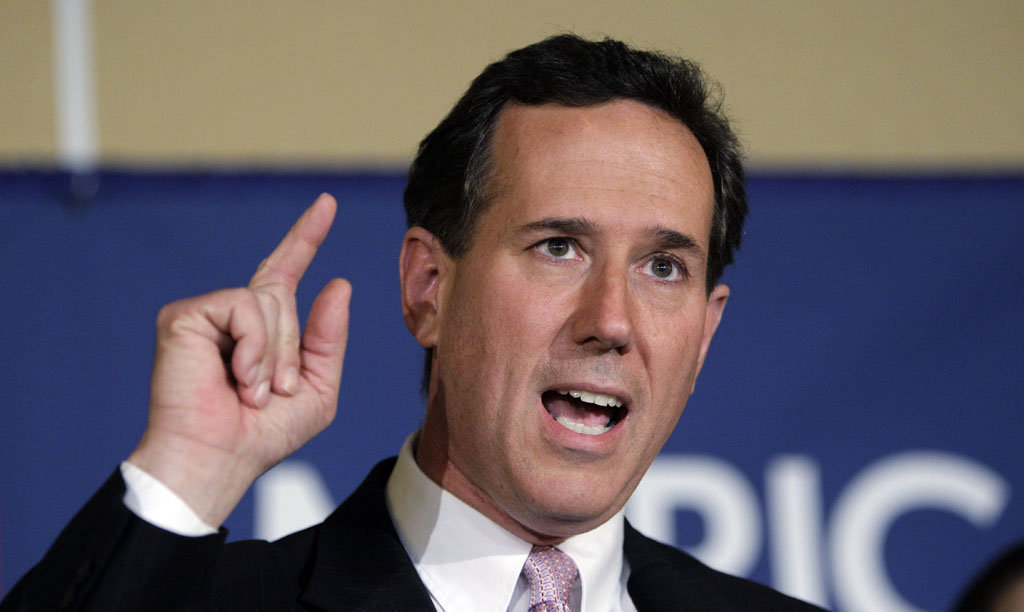Here’s a question for Ralph Reed and the ‘Teavangelical’ wing of the conservative movement: how can you portray yourselves as serious about governing when the keynote speakers at last week’s “Road to Majority” conference were Donald Trump and Sarah Palin?
Palin’s conference-closing remarks on Saturday featured a breathtakingly offensive joke about the Syrian civil war, which has taken an estimated 100,000 lives. She said we should just “let Allah sort it out.” Palin also had choice words for the bipartisan immigration reform bill moving through the Senate, which she dismissed as “a pandering, rewarding-the-rule-breakers, still-no-border-security, special-interest-written amnesty bill.” She was one of many conference speakers rhetorically crapping on Marco Rubio and the bipartisan “Gang of 8” reform bill and burning the bridges that conservative Latinos are trying to build.
At Friday night’s “gala” Reed bestowed a lifetime achievement award on Pat Robertson, who is increasingly difficult to take seriously, and who devoted his remarks to trashing President Obama. Trump, who also addressed the gala, spoke mostly about his own Trumpian greatness and how Mitt Romney might have been president if he had the guts to run Trump’s anti-Obama “you’re fired” ad. Trump shared plenty of pablum and piercing political insights, such as the Republicans needing to be “really smart” in choosing a “great candidate” in 2016. Trump also criticized the immigration reform bill as a “death wish” for the Republican Party, saying “every one of those people, and the tens of millions of people they will bring in with them, will be absolutely voting Democratic.”
There’s no question Ralph Reed still has pull. His conference opened with a luncheon featuring four Tea Party senators and he got a handful of Republican House members to speak along with former and future presidential hopefuls like Mike Huckabee, Herman Cain, Rick Santorum, and Ted Cruz. Rick Perry, who was introduced as a “Renaissance man,” bragged about the law he recently signed to protect the ostensibly threatened right of public school students to wish each other “Merry Christmas” Perry said, ““I hope my state is a glowing example of men and women who believe that those traditional values are how you make a stronger society.” Stronger society? Not so much.
In addition to the divide on immigration, relentless attacks on President Obama (Dick Morris said of the president, “he doesn’t care about national security”), and the unsurprising rhetoric on abortion, marriage, and supposed threats to religious liberty, there were some other major themes:
Government Bad
The conference was infused with the Tea Party’s anti-federal-government themes. Jonah Goldberg of the National Review reminded people of a video shown at the 2012 Democratic National Convention, which he recalled saying the government is the one thing we all belong to. “Now, as sort of a Tea Party-ish kind of guy, that makes me want to flip the safety on my rifle.”
Speakers urged activists to take advantage of the recent scandals surrounding the IRS, the Justice Department, and the National Security Agency. Santorum urged activists to “think big” and “seize the moment” provided by the IRS scandal. Sen. Ron Johnson said he would like Americans to apply their disgust about the scandals to the federal government in general. Rather than trying to restore faith in government, Johnson said, activists should be fostering distrust of the government.
Grover Norquist is known for his quip that he wants to shrink the government until it is small enough to drown in the bathtub. At Road to Majority he spelled out his plan to complete the strategy he embarked on with the Bush tax cuts and the no-tax-increase pledge he demands Republican candidates sign. He noted that “thanks to the marvels of modern redistricting,” Republicans are likely to have a Republican House until 2022, which means they have several chances to get a Senate majority and a Republican in the White House before then. Whenever that happens, he says, Republicans can put the Ryan budget into law and dramatically curtail government spending. He calls it “completely doable.”
Meanwhile, he said, in the 25 states where Republicans control the legislative and executive branches, activists should push for the passage of more anti-union legislation, and for laws that encourage people to obtain concealed carry permits, home school their children, and participate in stock ownership, three things that he said make people more Republican. He called this changing the demographics by changing the rules.
Obamacare: Will it Destroy America or Obama?
House Republicans have made repealing the Affordable Care Act – “Obamacare” – an obsession. Rick Santorum said opposition to the law should have been the centerpiece of the 2012 campaign. And many speakers repeated the demand that the health care reform law be repealed in its entirety. Stephen Moore, founder of the Club for Growth and a Wall Street Journal editorial board member, said repealing Obamacare is the single most important thing that has to happen in Washington over the next two years. But a number of speakers had a slightly different take, suggesting that the implementation of the complex law would be its undoing, and that public outrage at rising insurance rates would bring down the Obama administration. Dick Morris predicted Obama would be “destroyed” by the law’s implementation.
GOP: Friend or Foe?
One running theme of the conference was conservative activists’ distrust for national Republican leaders, particularly around opposition to abortion and LGBT equality. Several speakers made reference to the notorious RNC “autopsy” on the 2012 election and the perception that some party leaders want social conservatives to tone it down. Reed himself complained that while self-identified evangelicals represented 45 percent of the Republican ticket’s vote, some party leaders were saying they are the problem and should “ride in the back of the bus.” He vowed that on issue of abortion and man-woman marriage, social conservatives would not be silent, “not now, not ever.”
It’s not just Ted Cruz who mocks his fellow Republicans. Gary Bauer complained that the last two Republican nominees had a hard time talking about sanctity of life issues, and he said party officials in Washington spend too much time taking the advice of “cowardly pollsters and political consultants.” Mike Huckabee complained that “Republicans have been, if not equal, sometimes more guilty than Democrats in thinking the brilliant thing to do would be to centralize more power in the hands of the central government.” He said he’s “sick of hearing” that people think the GOP needs to move away from a conservative message.
There was enough grumbling that when it was RNC Chairman Reince Priebus’s turn to speak on Saturday, the Wisconsin Faith & Freedom official who introduced him felt a need to vouch for Priebus’s faith and commitment to conservative causes. He said angrily that it is “an absolute lie” that Priebus is not a social conservative and insisted that there is no division in the party.
Priebus started his remarks by establishing his religious credentials: “I’m a Christian. I’m a believer. God lives in my heart, and I’m for changing minds, not changing values.” He added, “I’m so grateful that we’ve got a party that prays, that we’ve got a party that puts God first, and I’m proud to be part of that.” He said he “gets it” that conservative Christians are a “blessing” to the party. He said the GOP needs to have a permanent ground game in place all across the country.
Priebus defended his plan to shorten the presidential primary season and move the party convention from August to June from critics who call it an insider move against grassroots conservatives. It isn’t an establishment takeover, he insisted, but a way to prevent a replay of the 2012, when Romney went into the summer months broke after a long primary season but not yet able to tap general election funding.
Still, not all the conservative are convinced that national Republicans are with them. Palin portrayed Republicans in Washington as being overly fond of government spending: “It doesn’t matter if it’s a Republican or a Democrat sitting atop a bloated boot on your neck, out of control government, everyone gets infected, no party is immune. That’s why, I tell ya, I’m listening to those independents, to those libertarians who are saying, you know, it is both sides of the aisle, the leadership, the good old boys….”
Phyllis Schlafly talked about having waged internal battles to make the GOP a solidly anti-abortion Party and encouraged activists not to be seduced by talk of a conservative third party but to work within the Republican Party to make sure the right people on the ballot. Norquist insisted that activists had helped brand the GOP as the party that will not raise your taxes, and he said Republican elected officials who vote for tax increases damage the brand for everyone else. They are, he said, “rat heads in coca-cola.”
Message Envy
It might surprise many progressives, who have spent years bemoaning the effectiveness of Republicans’ emotion-laden rhetoric, that speaker after speaker complained that Democrats are so much better than Republicans at messaging. Of course complaining about messaging is easier than admitting that there may be something about your policies that voters don’t like.
At a panel on messaging strategies, author Diane Medved said that when defending traditional marriage, she would love to say “what is it about ‘abomination’ that you don’t understand?” But she knows that won’t reach people who don’t already agree with her. She argued that conservatives should marshal the “science” that supports their positions. She also tried out a new messaging strategy, saying that opposition to marriage equality is a feminist issue because it is empowering to women to affirm that they are different than men. “Women deserve to have credit for being who they are as a separate gender and they are not interchangeable with men.”
Ryan Anderson, co-author of a book on marriage with Robert George, the intellectual godfather of the anti-marriage-equality movement, took issue with the name of the panel, which was “Don’t Preach to the Choir.” Anderson said the choir needs to be preached to, because too many Christians are giving up on marriage. There is no such thing as parenting, he insisted, there is mothering and fathering. Anderson said that anti-marriage equality forces have only been fighting for five years, while proponents have been fighting for 20 to 30 years. “It’s not that our argument for marriage has been heard and been rejected,” he said. “It’s that it hasn’t been heard at all.” Anderson promoted the widely discredited Regnerus study on family structures as evidence that science is on his side.
Eric Teetsel, executive director of the Manhattan Declaration, encouraged activists to be careful with their rhetoric. “I don’t believe that there are very many, if any, people in this movement, certainly not in public life, who have any ill will toward the same-sex community, at all. But sometimes we say things that make it sound like we do.” If Teetsel really believes that, he needs to spend some more time actually listening to conservative religious leaders, pundits and politicians who regularly charge that gay-rights advocates are Satan-inspired sexual predators who are out to destroy faith and freedom if not western civilization itself.
Don’t Worry, Be Happy or Arguing as a Lover with Stupid Liberals
Anyone who pays attention to religious right groups has been seeing the word “winsome” a lot. Conservative evangelical leaders are well aware of polling data that shows young Christians are turned off by the anti-gay bigotry they see in the church. So there’s a push on for everyone to make conservative arguments in a “winsome” way, to be “happy warriors” like Ronald Reagan, to be cheerful when arguing with liberals. Being cheerful was a big theme at Road to Majority. Said Rick Perry, “when we fight for our county, we need to do it with joy.”
The Manhattan Declaration’s Teetsel took this theme to new heights in the messaging panel in which he called for “arguing as a lover” when “trying to woo people over to our side”: be respectful, self-effacing, funny, give people an opportunity to save face. But he doesn’t seem to think much of his audience, saying America is no longer a society of ideas, and that in our celebrity-crazed culture it doesn’t make sense to appeal to 18th Century sources of authority like the Federalist Papers, which “are not considered authorities in my generation. People do not care what these men in wigs thought 300 years ago.”
“We serve a God who condescended to become a man in order to share his gospel. And I think that’s an example that we can learn from. Romans 12:16 advises us, do not be proud, but be willing to associate with people of low position. So we have to bite the bullet. We have to recognize some of these facts and condescend to watching Glee from time to time so that we can talk to people about it.”








